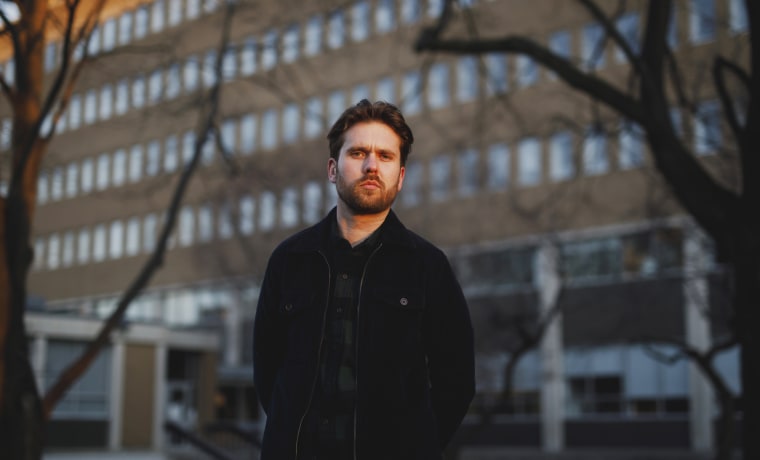LGBTQ students file class-action lawsuit against Department of Education
Lucas Wilson said he received conversion therapy from a student club called Band of Brothers at Liberty University from 2008 to 2012, when he was an undergraduate student.
Wilson, now 30, said when he visited campus prior to enrolling, he saw an ad for “struggling with same-sex attraction.”
“The biggest factor in why I chose Liberty was ultimately the conversion therapy program because I, in fact, believed that one could become straight,” Wilson said.
He is now one of 33 LGBTQ students who are suing the Department of Education in a class-action lawsuit filed Monday. The students allege that they faced discrimination at 25 federally funded Christian colleges and universities in 18 states.
Wilson said Liberty University is a “thoroughly homophobic institution” and that, in addition to offering conversion therapy in the form of a student club, he also had several classes that taught “the evils of the homosexual lifestyle.”

He said the conversion therapy group, and the culture at Liberty, “amplified and compounded feelings of self-hatred, feelings of shame and guilt and anxiety that ultimately took years to deconstruct.”
The Religious Exemption Accountability Project, or REAP, an organization that advocates for LGBTQ students at taxpayer-funded religious colleges and universities, filed the lawsuit in the U.S. District Court in Oregon on behalf of former and current students.
Liberty University has not responded to NBC News’ requests for comment. A spokesperson for the Department of Education said the Biden administration is “fully committed to equal education access for all students.”
The spokesperson added that President Joe Biden stated in an executive order earlier this month, “It is the policy of my Administration that all students should be guaranteed an educational environment free from discrimination on the basis of sex, including discrimination in the form of sexual harassment, which encompasses sexual violence, and including discrimination on the basis of sexual orientation or gender identity.”
Many Christian colleges and universities receive federal funding and are still allowed to enforce policies that, for example, prohibit same-sex relationships on campus. That’s because Title IX, the federal civil rights law that prohibits sex-based discrimination, contains an exemption for religious entities.
The students’ lawsuit argues that the religious exemption is unconstitutional and that it allows the Department of Education “to breach its duty” to LGBTQ students at religious colleges and universities “where discrimination on the basis of sexual orientation and gender identity is codified in campus policies and openly practiced.”
The ultimate goal of the lawsuit is to strike down Title IX’s religious exemption.
Paul Southwick, the director of REAP, said the main premise of his argument is that the federal government is “not allowed to pass laws or take actions that target a politically unpopular group.”
“Here, what the religious exemption to Title IX is doing is, it really targets people based on sex, which includes sexual orientation and gender identity, for inferior treatment,” Southwick said.
His argument claims that the religious exemption is unconstitutional because it violates the due process and equal protection rights afforded to LGBTQ people and it violates the establishment clause because it “favors certain fundamentalist religious organizations and gives them preferential treatment above all other educational institutions, including religious educational institutions that have affirming beliefs about LGBTQ people.”
Regarding the religious exemption, the Department of Education spokesperson said the text of Title IX states it does not apply to “an educational institution which is controlled by a religious organization” where its application “would not be consistent with the religious tenets of such organization.”
Southwick’s constitutional argument is based on a number of cases, but he said one of the most important is Bob Jones University v. United States, which found in 1983 that Bob Jones University did not get to maintain its tax-exempt status due to an interracial dating ban — a policy the university claimed was based in its sincerely held religious beliefs.
The Supreme Court held in an 8-1 decision that limitations on religious liberty can be justified by an “overriding governmental interest” such as prohibiting racial discrimination. As a result, it found that “not all burdens on religion are unconstitutional.”
Southwick said mainstream LGBTQ organizations haven’t done enough to fight for LGBTQ students at religious colleges, and that’s because “when you talk about queer kids at Christian colleges, their responses are ‘What the hell are they doing there?’”
LGBTQ students often attend religious colleges for a host of reasons, but mainly because they’re born into fundamentalist Christian families, Southwick said.
“The natural consequence of that is that — gay or straight — a lot of them will end up at Christian colleges, and when they’re there, they’re treated inhumanely and subjected to these dangerous and abusive policies and practices,” he said.
Some of the plaintiffs claim they were denied admission to or expelled from religious colleges due to being LGBTQ. Others say their colleges have strict policies surrounding sexuality and purity.
“The general language that you’ll find in a lot of the policies is as follows: The schools prohibit homosexual conduct, homosexual relationships, transgender conduct, which they struggle with how to describe,” Southwick said. “And they prohibit same-sex marriages. So what that means is kids are getting engaged and hiding it because they’ll be expelled. Kids who are found out are being expelled. What it means is when a nonbinary or a trans student is dressing and grooming and using names and pronouns consistent with their gender identity, they’re punished.”
The student club that offers conversion therapy at Liberty University still exists, though now it’s called Armor Bearers, according to the school’s 2020 “Pathways Handbook,” which provides students with a “menu” of “educational opportunities” to choose from if they violate school policy.
Wilson said the lawsuit will help shed light on the policies at Liberty and other religious schools.
“We’re putting pressure on these schools to change how they treat their LGBTQ students, so for me, this is very important work,” he said. “It’s work that is long overdue.”